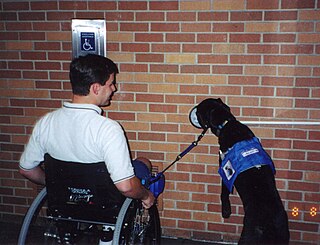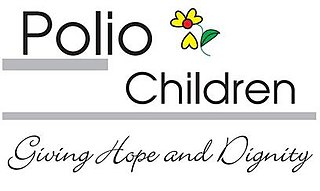| Formation | 1991 |
|---|---|
| Type | Non governmental organisation (Registered Society) |
| Legal status | Tax exempted |
| Location | |
| Coordinates | 21°06′11″N72°27′51″E / 21.1030°N 72.4641°E |
Region | Gujarat, India |
President | Kanubhai Hasmukhbhai Tailor |
Vice President | Rameshbhai Ishwarlal Gandhi |
Vice President | Swami Rajbharti |
Secretary | Gokul Bakshi |
| Website | Official website |
Disable Welfare Trust of India (DWTI) is an Indian non governmental organisation based in Surat, Gujarat, India, working in the areas of education, environment and the empowerment of women.
The Disable Welfare Trust of India was formed in 1991 by Kanubhai Hasmukhbhai Tailor, a physically disabled person who had permanent disability to his legs due to poliomyelitis he contracted at the age of eleven. [1] The primary aim of the organisation was to provide education and vocational training to the disabled children and work for their rehabilitation. [2] The activities during the initial years were limited due to paucity of funds but Tailor conducted a survey where he identified 1280 disabled children. A chance meeting, in 1997, with the then Police Commissioner of Surat, P. C. Pande and S. R. Rao, the Municipal Commissioner, helped the trust to get 10 rooms in a primary school. Here, Kanubhai started a school, [3] on 1 July 1957, with the financial assistance of ₹ 51,000 from Pande. Starting with four children, the trust grew to a student strength of 118 by the year end, and provided free transportation, educational aids, lunch and physiotherapy treatment to them. [2] [3] [4]
In 2000, the school moved to a larger facility with 18 rooms given by the Municipal corporation at Khatodara, Surat and the student strength grew to 400. Later, on a free land measuring 4500 square yards, a new facility was constructed in 2006, the foundation stone laid by the then Vice President of India, Bhairon Singh Shekhawat and the construction completed with the assistance of Reliance Industries and Larsen and Toubro. [2] The trust claims that the project is a success with many students going on to complete various professional degrees in management, engineering and medicine. [2]
The Trust is constructing a new facility to accommodate 1000 children and has plans to set up a hospital for corrective surgeries for disabilities. It also has a scheme to guide physically disabled people from the villages for availing loans, from ₹ 150,000 to ₹ 500,000 for setting up own businesses from the Handicapped Finance and Development Corporation, a government run institution. [2]
The main source of funding is through donations for which the government has extended tax exemption facility. [3] [5]

The social model of disability identifies systemic barriers, derogatory attitudes, and social exclusion, which make it difficult or impossible for disabled people to attain their valued functionings. The social model of disability diverges from the dominant medical model of disability, which is a functional analysis of the body as a machine to be fixed in order to conform with normative values. While physical, sensory, intellectual, or psychological variations may result in individual functional differences, these do not necessarily have to lead to disability unless society fails to take account of and include people intentionally with respect to their individual needs. The origin of the approach can be traced to the 1960s, and the specific term emerged from the United Kingdom in the 1980s.

Service animals are working animals that have been trained to perform tasks that assist disabled people. Service animals may also be referred to as assistance animals or helper animals depending on the country and the animal's function. Dogs are the most common service animals, having assisted people since at least 1927.
The Ministry of Social Justice and Empowerment is a Government of India ministry. It is responsible for welfare, social justice and empowerment of disadvantaged and marginalised sections of society, including scheduled castes (SC), Other Backward Classes (OBC), LGBT people, the disabled, the elderly, and the victims of drug abuse. It also helps in the enforcement of legislation with regards to these marginalized groups to better enforce anti-discrimination policies.
Treloar School and College is a non-maintained residential and day special school and college for disabled children and young people aged from 2 to 25 in Holybourne near Alton, Hampshire, UK.
Disability Rights UK (DR UK) is a UK pan-disability charity which was set up with the aim of representing the needs and expectations of disabled people in the UK. Disability Rights UK was formed as a result of several disability charities merging in 2012.
The Union of the Physically Impaired Against Segregation (UPIAS) was an early disability rights organisation in the United Kingdom. It established the principles that led to the development of the social model of disability, wherein a sharp distinction is made between impairment and disability. From the organisation's policy statement: "What we are interested in, are ways of changing our conditions of life, and thus overcoming the disabilities which are imposed on top our physical impairments by the way this society is organised to exclude us."
The Human Resources Administration or Department of Social Services (HRA/DSS) is the department of the government of New York City in charge of the majority of the city's social services programs. HRA helps New Yorkers in need through a variety of services that promote employment and personal responsibility while providing temporary assistance and work supports. Its regulations are compiled in title 68 of the New York City Rules. The current Commissioner of HRA is Molly Wasow Park, who was appointed to the position by Mayor Eric Adams. HRA is the largest city social services agency in the United States. It has a budget of $9.7 billion, employs over 14,000 people, and serves over 3 million New Yorkers.

Spastic Society of Gurgaon covers within its scope the programs on occupational therapy, counseling, vocational training and psychotherapy of the children with autism, cerebral palsy, intellectual disability and multiple disabilities in Haryana, India. It is India's first non-profit disability sector organization which was awarded ISO certification by United Kingdom Accreditation Service: United Registrar of Systems for quality of services rendered by it. It also works in the field of imparting counseling and psychotherapy to the parents and guardians of the disabled children. Mass camps are conducted for welfare of children with disabilities. Multiple single window services like assistance in issuance of disability certificates, NIRAMAYA cashless insurance cards, medical check ups, distribution of medicines and medical aids are rendered to disabled people in such camps. Being sponsored by Haryana Government it undertakes disability audits of organizations for assessing accessibility compliance by them.

Hollybank was one of the first registered schools for disabled children to be built in the North of England. It is a registered charity and care home, specialising in caring for children with multiple and profound disabilities. Hollybank Trust was established in 1954 in Lindley, a suburb of Huddersfield in Yorkshire. Huddersfield is known for its central role at the beginning of the Industrial Revolution, for being the birthplace of rugby league and birthplace of the former British Prime Minister, Harold Wilson. According to its website it employs over 500 full and part-time staff at locations across Yorkshire, in Mirfield, Halifax, Holmfirth, Barnsley and South Kirkby. Local Paralympian athlete Paul Cartwright, is ambassador for the Hollybank School, which he attended as a boy. Paul represented Great Britain at the 1984 Stoke Mandeville Paralympic Games in 100m, 200m, 400m sprint, and the marathon.
Disability in the United Kingdom covers a wide range of conditions and experiences, deeply impacting the lives of millions of people. Defined by the Equality Act 2010 as a physical or mental impairment with a substantial and long-term adverse effect on a person's ability to carry out normal day-to-day activities, it encompasses various aspects of life, including demographics, legislation, healthcare, employment, and culture. Despite numerous advancements in policy and social attitudes, individuals with disabilities often encounter unique challenges and disparities.

Kanubhai Hasmukhbhai Tailor is an Indian social worker who is physically disabled. He is from Gujarat and the founder of the non governmental organization, Disable Welfare Trust of India, working towards the upliftment of physically disabled people. The Government of India honored Tailor in 2011, with the fourth highest civilian award of Padma Shri.
Uma Tuli is an Indian social worker, educationist and the founder of Amar Jyoti Charitable Trust, a Delhi-based non-governmental organisation, working for the rehabilitation of physically disabled people. She was honoured by the Government of India, in 2012, with the fourth highest Indian civilian award of Padma Shri.

Polio Children is an international non-governmental organization which has fundraised over £1.3million to fund projects in India, Tanzania, South Sudan and Sierra Leone which enhance the welfare of children with poliomyelitis. The charity has provided scholarships, vocational training and material assistance to polio victims across the world to ensure they can live dignified, independent lives.
Home and Hope, Rourkela is a non-profit organization that has been working to meet the needs and protect the interests and rights for disabled people.
There are 26.8 million people with disabilities in India according to the 2011 census of India, while other sources have offered higher estimates. India is a party to the United Nations Convention on the Rights of Persons with Disabilities. Legislation that affects people with disabilities in India includes the Rights of Persons with Disabilities Act, 2016, the Mental Health Care Act, 2017, the National Trust Act, 1999, and the Rehabilitation Council of India Act, 1992. People with disabilities in India are faced with negative social attitudes in the wider population.

Singapore does not have a formal definition of disability. Singapore signed on to the Convention on the Rights of Persons with Disabilities in 2013 and coordinates the Enabling Masterplan with both government and non governmental organisations.
As of 2007, there are almost one million people with various levels of physical and mental disabilities in Taiwan. Taiwan adopted a universal healthcare system in 1995 to properly support patient care and provide more transparent access to its people, including those who identify as disabled. Taiwan is a nation that has grown tremendously to support those that are disabled. This includes having a socialized form of medical care that is run by the Executive Yuan. Overall this universal scheme includes the law, public facilities, and educational aspect of healthcare. Taiwan also has different aspects of healthcare to effectively support those that are disadvantaged or disabled, this included subsidies, loans, plans, service guarantee and specific care for medically vulnerable populations. Taiwan's healthcare development and dedication to support its people plays an important role in its transformation of benefits for disabled people.
Shrimad Rajchandra Hospital is a charitable, multi-bed hospital located in the city of Dharampur in the Valsad district of Gujarat, India. The hospital currently operates under the administration of Shrimad Rajchandra Love and Care, a non-governmental organisation (NGO) which runs the hospital and other charitable activities. Established in 2003, it provides medical care at nominal rates or completely free of cost. Hospital records show that over 125,000 patients were treated in 2016, and over 1 million patients have been treated since the inception of the hospital in 2004.
The British Council of Organisations of Disabled People (BCODP) was a radical national voice of disabled people for legal, social and cultural change in Britain from 1981 to 2017, with a high profile in the 1980s and 1990s.